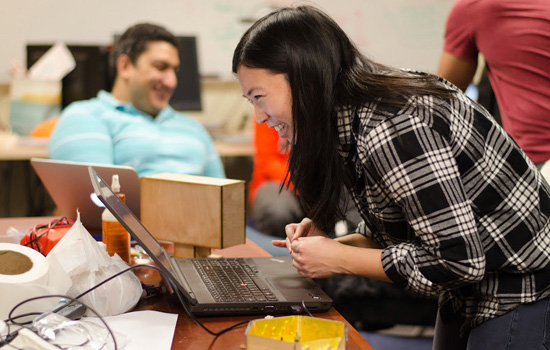RIT to offer human-centered computing degree
Interdisciplinary degree combines computing, design and psychology
Julia Prisaznuk
Amanda Yung, a human-computer interaction master’s student at RIT, works on a project in user experience design—an area that is covered in RIT’s new human-centered computing undergraduate degree program.
A new major being offered at Rochester Institute of Technology will prepare graduates to advance the ways that people interact with technology.
The bachelor’s degree in human-centered computing will combine principles from computing, design and psychology to help students create interfaces to technology with a human focus from the beginning to the end.
The undergraduate program is currently accepting students and will bring in its first freshman class next fall.
The field of human-centered computing aims at radically changing computing with new ways to design and build systems that support and enrich people’s lives. These designs take into account many personal, social and cultural contexts, including physical capabilities, age, background and location.
“New technology is great, except when we can’t use it,” said Steve Zilora, professor and Chair of RIT’s Department of Information Sciences and Technologies. “The human-centered computing degree is about access—with seamless interaction—so that all of us, regardless of abilities, can realize the benefits of computing technology.”
Students will learn from the three disciplines, including how to program, about cognitive psychology and how to design web and mobile interfaces. The interdisciplinary degree program allows students to take a variety of courses in RIT’s B. Thomas Golisano College of Computing and Information Sciences, the College of Imaging Arts and Sciences and the College of Liberal Arts.
“This is a chance for RIT to capitalize on the fact that we have experts in all these areas,” said Andrew Herbert, professor and Chair of RIT’s Department of Psychology. “It will also allow our students to graduate with a better position to step right into the workplace and deal with higher-level problems.”
Human-centered computing professionals are a driving force at the center of the global accessibility effort, making sure that technology is usable by anyone. Zilora says that HCC professionals are trained to think about all technology users, including those who are older, deaf and hard-of-hearing, vision impaired or physically impaired.
“Human-centered computing really stood out to me as something different and something that has the potential to change a lot of lives in the future,” said Lauren Johnston, a first-year computing exploration student from Lebanon, Pa., who is considering HCC as a major. “It challenges not only my ability to understand the logic in programming, but also my ability to understand the enigma of the human brain.”
The degree features six areas of concentration, allowing students to immerse themselves in the two areas that they find most interesting, including accessibility, design, front-end development, psychology, instructional technology and natural language processing.
“This major is perfect for the person who likes technology and wants to look at the big picture,” said Zilora. “These students will figure out how to make the technology revolution available to everyone.”
For more information about the human-centered computing degree program, go to hcc.rit.edu.















